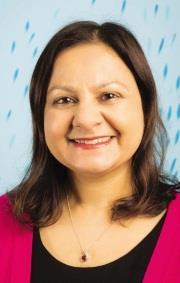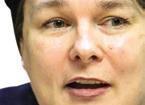Wanting to do more to ensure patients’ voices were heard, Shahana Ramsden set out on a year long programme to hone her leadership skills. Jennifer Trueland reports


When Shahana Ramsden was made redundant from a senior post in the Department of Health, she was tempted to accept that she had got as far as she would in her career.
But with many years’ experience working in the area of equality and in ensuring that the voice of patients and the public is heard, she did not want to give up that easily.
“Deep down, I knew I wanted to do more,” she says. “I had more that I wanted to put into the NHS.”
For Ms Ramsden, the NHS Leadership Academy’s Nye Bevan programme has been a big stepping stone. She credits the year long course, aimed at senior leaders looking to move into an executive director role, not just with honing her leadership skills, but for giving her the confidence to reach the next level.
“It encouraged me to apply for more senior posts,” she says. “It helped me to realise I really had something to offer.”
Also in Leading the Way:
- ‘We wanted to give something back’
- Our foundation trust’s got talent
- Let’s unlock our people’s potential
- Nurturing leadership can go deeper
- Visit the Leading the Way series page
- More leadership news and best practice resources
People first
Today Ms Ramsden’s role as senior co-production lead spans both NHS England and the Coalition for Collaborative Care. She supports national programmes to develop people focused strategies and to involve people who use services, as well as their carers and families, in co-producing and co-designing national policy.
“Within 12 weeks of starting the Bevan programme, I was appointed to a new post and 12 months later I was offered a newly created role in a more senior position,” she smiles. “I think it gave me confidence to see what opportunities were available and take them.”
The programme, a mix of online, group and residential learning, was hard work, she says, and at first she did not know what to expect.
“It was a big time commitment; I’m the sort of person that if someone sends me suggested reading, then I’ll read it all. But I loved it – we had a virtual campus, and it was very interactive. I felt I learned a lot.”
‘Every aspect of my brain was being exercised and I developed a whole range of skills’
Access to some top people, including experts from KPMG and leadership mentors, was an important part of the course, she says. “I felt every aspect of my brain was being exercised, and I developed a whole range of skills,” Ms Ramsden says. “The kind of people who trained us were people I would never have been able to access otherwise.”
She was part of a cohort of 49 people, including clinical commissioning group chief executives and medical directors. She admits feeling apprehensive at first.
“My greatest anxiety was that I wouldn’t be able to keep up at an intellectual level,” she says. “But I soon realised that these people shared with me empathy for people and wanting to put patients at the heart of everything that we do.
“I had many light bulb moments, and one was that it wasn’t a case of ‘them and us’,” she explains. To be a good leader, it shouldn’t be you against the patient, or you against your colleagues. Everyone should be working together to improve patient outcomes.”
Building skills
With a background in equalities and patient engagement, she admits that she did not perhaps give others enough credit. “My values have always been very important to me; I’d wear them as a badge. But then I realised that so many people shared these values and ethics.”
She felt her confidence build during the course with exercises such as dealing with different scenarios or mock board meetings, helping her to develop skills. But it also helped her to recognise and value her own contribution.
“In previous [training] programmes I’ve tried to learn the jargon that people use; but through the Nye Bevan programme I’ve learned to question it. It also reminded me of the importance of using plain English.
‘This gave me more tools so that I can make it happen in practice’
The peer assessment element of the programme was nerve wracking, but also helped her become more confident, she says. “There were moments of realisation, a sense that ‘yes, I am good at that’,” she says. “I realised I’d got a lot to offer the NHS.”
Many of these feelings are shared by Marie Hardacre, matron for the emergency care group at Doncaster and Bassetlaw Hospitals Foundation Trust, who completed the Leadership Academy’s Mary Seacole programme in October.
Ms Hardacre found the year long programme, which is aimed at people hoping to move into their first recognised leadership position, helped her develop skills in herself and those she leads. “We’re always told about empowering the team, but we’re not trained in how to do it,” she explains.
“It’s about getting people to reflect on why they became nurses in the first place, and getting the team to think about what’s the value of good care.
“To get anything out of a ward, you need to be able to lead them to achieve a goal, rather than telling them what to do, or telling them how to do it. I knew that, but this gave me more tools in the toolbox so that I could make it happen in practice.”
Karen Lynas on Supporting leaders

I start the week as my colleagues and I often do - opening one of our professional leadership programme residential events. This morning I face a room of 48 people working at or just below board level in healthcare.
Most of them are in the room because they are ambitious to move to a more senior level, to take on a role that comes with huge responsibility, enormous pressure, and the potential to improve the working lives of staff. All of them are in the room because they are deeply committed to providing exceptional care fit for patients, carers, and communities today and for the foreseeable future.
These people are invariably bright, some ferociously intelligent. They are caring and some are deeply compassionate. They have energy, enthusiasm and a desire for innovation and improvement.
I am weary of reading that we are struggling for senior talent in the NHS. HSJ’s Respect for NHS Managers inquiry is welcome because it asks all the right questions, makes some hugely helpful recommendations and shines a light on some challenges we need to address. It also makes the same point: Why is there a lack of ready now senior leaders for these complex roles in organisations?
At some point the recommendations of the Smith and Rose reviews will be made public, we might all assume similar observations will be made then.
So from me, loudly, often and to anyone who will listen: there is not a dearth of talent in the NHS. We have it in diverse abundance.
We have a leadership community that many corporates would die for - bright, committed and no matter how often you tell them they are the problem they keep coming into work and getting on with it. No matter how often you reorganise them they will be flexible and creative and keep coming in to work and getting on with it.
And all of this is finite. There will come a point very soon when this isn’t enough. And there is something we can do.
Like any other industry and other large corporate organisation we should now be planning to make sure we have the expertise, diverse talent, experience and compassionate leadership at every level that we need. We should stop assuming it will happen by accident and that if we only tell people often enough what not to do, or shout ever more loudly about what they should do they will go through some process of osmosis and assume the skills, knowledge, attitudes and behaviours we need.
If there is a view that the right skills and knowledge aren’t available at the most senior levels, we need to invest at every level to create a pipeline to ensure we do. If your organisation is fruitless in its search for the next fabulous director you might ask yourself what you have done to create proper succession planning.
We have talent, we have values led leaders.
They need new skills, new knowledge and new expertise to lead in a world for which they could never have been trained. Our leaders need investing in so that they become the leaders we need. It isn’t for want of potential.
But the context in which they operate has changed hugely and we need to retrain, develop, stretch and challenge our leaders in safe ways to prepare them for this new context; to ready them for the new challenges they face; and equip them to lead with hope and compassion through expertise, competence and confidence.
The NHS Leadership Academy is here to help all those in leadership roles develop the potential we know they hold and make the contribution they are desperate to make. We are here to help organisations plan for the future leadership talent they will need and support their staff in gaining the skills, knowledge and behaviours to manage today and plan for tomorrow.
The talent is there for the picking. It is up to us to pick it up and start cherishing it.
Karen Lynas is deputy managing director of the NHS Leadership Academy.
www.leadershipacademy.nhs.uk
When a year long programme became a confidence booster

Learning the leadership skills to give voice to patient concerns
 Currently
reading
Currently
reading
When a year long programme became a confidence booster
- 2



























1 Readers' comment